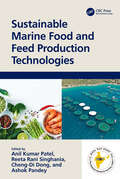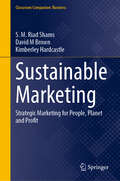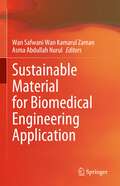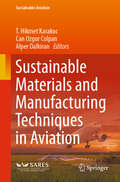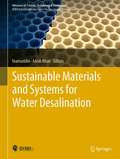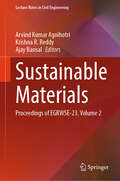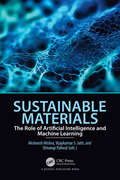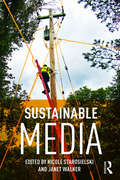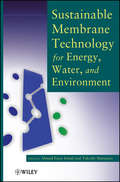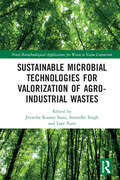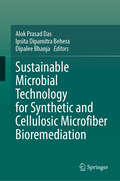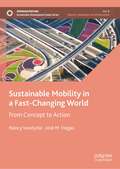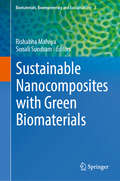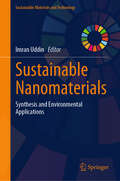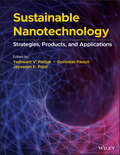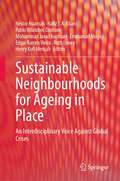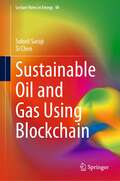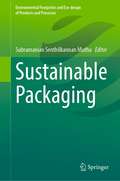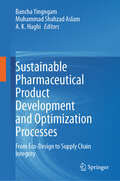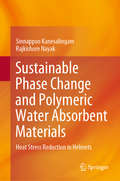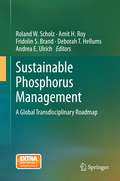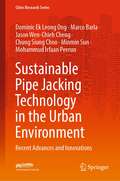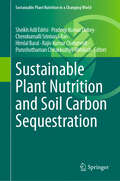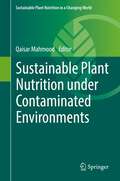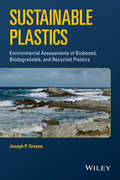- Table View
- List View
Sustainable Marine Food and Feed Production Technologies
by Ashok Pandey Reeta Rani Singhania Anil Kumar Patel Cheng-Di DongThis valuable reference book covers the application of marine resources like algae, fishes, and shrimp to address food challenges of the world. It compiles technological advancements in employing these resources for food and food supplements to enhance human health. The book includes chapters from international experts. The book discusses interesting topics like exploitation of marine wastes as nutraceuticals, cultivation, processing, and production of seafood and includes a section on other applications of marine organisms, such as the removal of pollutants from wastewater. This book is meant for graduate students and researchers in food science. It is also useful to experts in the food industry.
Sustainable Marketing: Strategic Marketing for People, Planet and Profit (Classroom Companion: Business)
by S. M. Shams David M Brown Kimberley HardcastleThis core textbook empowers and inspires students with sustainable marketing strategies to pursue the triple bottom line; People, Planet and Profit. The purpose is to underpin a brand’s commercial competitive advantage through its societal and environmental impact. It presents complex cross-disciplinary and cross-functional theoretical and practical discussions in a simplified manner to specify how the learning outcomes from different chapters can address the grand challenges associated with climate change, economic instability, geopolitical uncertainty, and inequity whilst underpinning profit-making ventures responsibly. The authors also demonstrate how the learning outcomes from this book can be applied in pursuit of each of the 17 United Nations (UN) Sustainable Development Goals (SDGs). Each chapter features a chapter summary, preliminary vignette, key terms, web exercises, review and discussion questions, and a practice quiz. Throughout the text there are also specific teaching features to provide students and instructors with an enhanced pedagogical experience. These features include: The Manager’s Corner: These sections provide real-world examples that instructors may highlight to exemplify theory or as mini cases for discussion Sustainable Marketing in Action: These sections inspire students to apply concepts and theories to actual business situations This core textbook prepares the next generation of sustainable marketers to pursue their career goals with a commitment to fostering a positive and sustainable impact on society, the environment, the economy, their organizations, and themselves.
Sustainable Material for Biomedical Engineering Application
by Wan Safwani Wan Kamarul Zaman Asma Abdullah NurulSustainable Material for Biomedical Engineering Application discusses current interdisciplinary approaches in the development of materials and their derivatives that are sustainable for biomedical engineering application. Recent advancement of materials research has shown to have great impact on biomedical and clinical applications. With potential for sustainability, the materials discussed and illustrated in this book, may have the ability to increase and contribute to wider therapeutic options for patients. On the other hand, with the advancement in materials technology, they also have positive impacts in terms of reproducibility and more cost-effective manufacturing solutions for biomedical engineering industry. Some of the main aspects covered in this book are utilisation of human waste, food waste and green technology approach for materials in biomedical engineering applications such as tissue engineering, 3D printing and biosensing. A team of experts from various disciplines share recent advances that provide details and integrates different approaches to sustainable materials development. This book is intended for academicians, researchers, students and industrial players in the field of materials and biomedical engineering.
Sustainable Materials and Manufacturing Techniques in Aviation (Sustainable Aviation)
by T. Hikmet Karakoc Can Ozgur Colpan Alper DalkiranThis book offers comprehensive coverage of sustainable materials and manufacturing techniques in aviation that reduce fuel consumption, increase operational efficiency, and make more sustainable use of raw materials, energy, and water during manufacturing. Materials that enable the aircraft to be lightweight without compromising safety issues are covered. The sustainability aspects in selecting the materials and manufacturing techniques, as well as performance, cost, and environmental aspects are discussed. Artificial intelligence, machine learning, and digital twins in manufacturing are covered. Sustainable Materials and Manufacturing Techniques in Aviation will appeal to a broad readership in the aviation community, including students, engineers, scientists, and researchers, as a reference source for material science and modern production techniques. Offers guidance on the selection of sustainable materials for aircraft; Discusses additive manufacturing for aviation applications; Covers artificial intelligence and machine learning as well as digital twin in manufacturing.
Sustainable Materials and Systems for Water Desalination (Advances in Science, Technology & Innovation)
by Inamuddin Anish KhanThis edited book explores the most promising and reliable technological developments expected to impact on the next generation of desalination systems. The book includes research studies which takes the reader on a fascinating walk through the multidisciplinary world of membrane science applied to water treatment. Concerning the ultimate technological advancement, the book seeks to investigate how to bridge the gap between the laboratory scale and the applicability to industry.
Sustainable Materials: Proceedings of EGRWSE-23, Volume 2 (Lecture Notes in Civil Engineering #509)
by Krishna R. Reddy Arvind Kumar Agnihotri Ajay BansalThis book contains peer-reviewed and selected papers presented during the International Conference on Environmental Geotechnology, Recycled Waste Materials and Sustainable Engineering (EGRWSE) 2023, held at NIT Jalandhar. It discusses the recent innovations, trends, concerns, practical challenges encountered, and the solutions adopted in waste management and engineering, geotechnical and geoenvironmental engineering, infrastructure engineering and sustainable engineering. This book can serve as a useful resource for researchers, educators, policymakers, and professionals working in the field of civil engineering, chemical engineering, environmental sciences, and public policy.
Sustainable Materials: The Role of Artificial Intelligence and Machine Learning
by Akshansh Mishra Vijaykumar S. Jatti Shivangi PaliwalThe self-learning ability of machine learning algorithms makes the investigations more accurate and accommodates all the complex requirements. Development in neural codes can accommodate the data in all the forms such as numerical values as well as images. The techniques also review the sustainability, life-span, the energy consumption in production polymer, etc. This book addresses the design, characterization, and development of prediction analysis of sustainable polymer composites using machine learning algorithms.
Sustainable Media: Critical Approaches to Media and Environment
by Janet Walker Nicole StarosielskiSustainable Media explores the many ways that media and environment are intertwined from the exploitation of natural and human resources during media production to the installation and disposal of media in the landscape; from people’s engagement with environmental issues in film, television, and digital media to the mediating properties of ecologies themselves. Edited by Nicole Starosielski and Janet Walker, the assembled chapters expose how the social and representational practices of media culture are necessarily caught up with technologies, infrastructures, and environments.Through in-depth analyses of media theories, practices, and objects including cell phone towers, ecologically-themed video games, Geiger counters for registering radiation, and sound waves traveling through the ocean, contributors question the sustainability of the media we build, exchange, and inhabit and chart emerging alternatives for media ecologies.
Sustainable Membrane Technology for Energy, Water, and Environment (Sustainable Water Developments - Resources, Management, Treatment, Efficiency And Reuse Ser. #3)
by Takeshi Matsuura Ahmad Fauzi IsmailA detailed look at the most recent developments in sustainable membrane technology for use in energy, water, and the environment A collection of twenty-seven groundbreaking papers on important ideas about the development of membrane science and technology, Sustainable Membrane Technology for Energy, Water, and Environment brings together contributions from leading international experts in one comprehensive volume. Covering the latest developments and most innovative ideas in the field, this book is a unique resource for understanding the growing interest in using membranes across several industries. Divided into six chapters that cover new membrane materials and membrane development; membrane applications for gas and vapor separation; membrane applications in water treatment; environmental applications of membranes; energy applications of membranes; and other industrial membrane applications, the book looks at the current and emerging applications for membrane science and technology in detail. As the Association of Southeast Asian Nations (ASEAN) and the Middle East emerge as the next generation of membrane research and development centers, in part due to their need for water and natural gas production technology, this book provides invaluable insights into the cutting-edge work taking place in these regions. Additional topics covered also include new membrane materials, membrane applications for food processing, and much more. Designed for engineers, scientists, professors, and graduate students who are engaged in membrane R&D activities, as well as for anyone interested in sustainable development, Sustainable Membrane Technology for Energy, Water, and Environment is a cutting-edge look at membrane applications.
Sustainable Microbial Technologies for Valorization of Agro-Industrial Wastes (Novel Biotechnological Applications for Waste to Value Conversion)
by Jitendra Kumar Saini Surender Singh Lata NainThis book provides an overview of the different aspects of microbial bioconversion methodologies for valorization of underutilized wastes of varied nature. It covers microbiological/biotechnological aspects, environmental concerns, bioprocess development, scale-up aspects, challenges, and opportunities in microbial valorization at commercial scale. It explains sustainable microbiological processes for bioconversion and valorization of the wastes for production of various products of commercial interests, including biofuels, bioenergy, and other platform chemicals. The book • presents potential biotechnological topics and strategies for the valuation of agricultural waste materials; • provides technical concepts on the production of various commercially significant bioproducts; • introduces various microbial bioprocesses to sustainably valorize various potential wastes as renewable feedstocks for production of biofuels and biochemicals; • explores the relevant scale-up opportunities, commercialization aspects, and critical technological advances; and • explains concepts and recent trends in life cycle analyses in waste valorization. It is aimed at researchers and graduate students in bioengineering, biochemical engineering, microbial technology/microbiology, environmental engineering, and biotechnology.
Sustainable Microbial Technology for Synthetic and Cellulosic Microfiber Bioremediation
by Alok Prasad Das Ipsita Dipamitra Behera Dipalee BhanjaThis book offers a variety of cases that detail microbial technologies for remediation of microfiber pollution. Synthetic microfibers are made up of polypropylene, nylon, and polyethylene terephthalate. They are porous and dry which makes them ideal for cleaning, but wide use of synthetic microfibers across industries and the human population in general has led to the accumulation of microfiber wastes in both terrestrial and marine ecosystems. Microfibers are a major environmental pollutant due to their endurance, omnipresence, and synthetic composition. Due to their undetectable size and wide distribution, microfibers slowly get incorporated within the food chain leading them into the higher trophic level. Microbial remediation of Synthetic microfibers through biodegradation is a sustainable and economic solution. With advanced bioremediation technology, novel methods have been developed for remediation, recovery, and recycling. Some of these methods are detailed in this volume.
Sustainable Mobility in a Fast-Changing World: From Concept to Action (Sustainable Development Goals Series)
by Nancy Vandycke José M. ViegasOur world is changing fast. Countries’ transport systems, which have long been shaped by project-by-project considerations, must help achieve higher-level goals for the well-being of mankind, as embodied by the UN's Sustainable Development Goals and the Paris Climate Agreement. New forces impose greater effectiveness in the way public choices are made, such as making better use of data and technologies, adopting a more inclusive and participatory approach to decision making, and addressing social concerns about equity. Transport practitioners and country decision-makers have been looking for structured and coherent guidance about ways to adjust to these new dynamics and change the trajectory of transport system. This book examines the rationale for and details an innovative approach for public decision-making to expedite the pace to sustainable mobility.
Sustainable Nanocomposites with Green Biomaterials (Biomaterials, Bioengineering and Sustainability #2)
by Rishabha Malviya Sonali SundramThe book delves into the realm of biomaterials with a strong focus on sustainability, offering insights into their diverse applications in advanced therapeutics, and, diagnostics. Tackling cutting-edge topics, it explores the latest developments in green biomaterials for biomedical implants and tissue engineering, emphasizing sustainability in nanocomposite synthesis, properties, and applications. The book also addresses the groundbreaking concept of biodegradable and biofriendly transient devices for sustainable monitoring and healing. Further, it highlights the crucial role of biodegradable scaffolds in engineering living tissues and discusses gene-activated matrices for tissue engineering and regenerative medicine. Various chapters delve into specialized applications, such as tissue-engineered cartilage products, green biomaterials for innovative drug delivery, and 3D printed biodegradable metals in orthopedics and stomatology. The book also explores the use of bioresorbable polymers in advancing minimally invasive surgical procedures and customizing medical devices for personalized medicine. Additionally, it sheds light on the integration of nanobioengineered platforms in electrochemical biosensors for disease diagnosis, antimicrobial biomaterials in dental healthcare, silk-based biomaterials for regenerative medicine and drug delivery, and the utilization of plant-derived biomaterials in cardiac tissue repair. This comprehensive volume not only provides a snapshot of the latest advancements in the field but also underscores the pivotal role of green biomaterials in shaping the future of healthcare technologies.
Sustainable Nanomaterials: Synthesis and Environmental Applications (Sustainable Materials and Technology)
by Imran UddinThis book brings together various topics of nanomaterials in various industrial applications to promote sustainable development practices. The first part of the book describes green nanotechnology for clean energy and environmental sustainability, which includes heavy metal detoxification from water, wastewater remediation, dye degradation, and bioremediation. The second part of the book covers sustainable biomedical applications of nanomaterials such as antibacterial activity and drug delivery systems, which includes the toxicological as well as the antibacterial impacts that nanoparticles have on microorganisms. The subsequent chapters discuss the roles of nanomaterials for sustainability in agriculture, crop protection, plant disease management, food technology (increasing the efficiency of the food industry), and the textile industry. The book caters to researchers and scientists who are interested in the utilization of nanomaterials to enhance sustainable industrial practices.
Sustainable Nanotechnology: Strategies, Products, and Applications
by Jayvadan K. Patel Yashwant V. Pathak Govindan ParayilSustainable Nanotechnology A robust examination of the use of nanotechnology in the manufacture of sustainable products In Sustainable Nanotechnology: Strategies, Products, and Applications, a team of distinguished researchers delivers a comprehensive and up-to-date exploration of nanotechnology applications in environmental, pharmaceutical, and engineering products in the context of global sustainability. The book offers balanced coverage of the benefits and risks of nanotechnology. Divided into three parts, the editors have included contributions from leading scholars discussing sustainability, toxicological impacts, and nanomaterial-based adsorbents. This edited volume helps readers understand how nanotechnology and nanomaterials apply in different global sustainability challenges. It also discusses models for understanding the lifecycle and risk assessments of manufactured nanomaterials. Case studies are included to explore such topics as design, remediation, and technology assessment. The book also provides: Thorough introductions to nanotechnology-based research priorities for global sustainability and the challenges and opportunities of modern, sustainable nanotechnology Comprehensive explorations of improving the sustainability of bio-based products with nanotechnology and the improvement of the environmental sustainability of biopolymers using nanotechnology Practical discussions of nanotechnology-based polymers for drug delivery applications In-depth examinations of green nanotechnology-driven drug delivery systems Perfect for nanotechnology-focused professionals, sustainability experts, biomedical experts, and pharmaceutical industry practitioners, Sustainable Nanotechnology: Strategies, Products, and Applications will also earn a place in the libraries of neuroscientists, bioengineering professionals, and those involved in neuroprosthetic engineering.
Sustainable Neighbourhoods for Ageing in Place: An Interdisciplinary Voice Against Global Crises
by Emmanuel Mogaji Hafiz T. A. Khan Ruth Lowry Nestor Asiamah Pablo Villalobos Dintrans Mohammad Javad Koohsari Edgar Ramos Vieira Henry Kofi MensahThis timely book provides an understanding of how an ageing population can maintain health in the ageing process in their preferred homes and neighbourhoods while coping with global crises of climate change events, infectious diseases, systemic violence, and radical or extreme industrialisation. It is the first-known volume to consider the four crises as health and social threats to healthy longevity from a sustainability perspective. The book is a collection of commentaries, theoretical frameworks, case studies, and empirical evidence that: (1) provides an analysis of how the crises affect neighbourhood attributes and the ability of residents to use them to maintain health while living in their preferred neighbourhoods, and (2) suggests potential interventions for enabling residents to utilise these attributes for health while living at home in contexts experiencing the crises. Contributions are authored by scholars and practitioners from various disciplines including public health, health care, architecture, engineering, human resources development, information technology, and finance. Among the topics covered:The Impact of Crises on Older Adults’ Health and Function: An Intergenerational Perspective A Behavioural Approach to Sustainable Neighbourhoods: A Philosophical Construction of a Friendly NeighbourhoodAssistive Technologies for Ageing in Place: A Theoretical Proposition of Human Development Postulates “Sustainable Ageing” in a World of CrisesSustainable Neighbourhoods for Ageing in Place: An Interdisciplinary Voice Against Global Crises serves as both a primary and secondary text particularly suited for post-graduate level study (e.g., MSc, PhD). Each chapter richly describes events, phenomena and models in a way that fits contemporary curricula for students and instructors in sociology, gerontology, architecture, environmental science studies, sustainability, ageing studies, and public health. Researchers in a broad range of disciplines can use the book as a research guide to design their studies based on models and insights described in its contents. With theoretical frameworks and recommendations from this book, stakeholders can understand what a sustainable neighbourhood is in the context of crises by presenting problems and solutions from different countries and disciplines.
Sustainable Oil and Gas Using Blockchain (Lecture Notes in Energy #98)
by Si Chen Soheil SarajiThis monograph explores the potential of blockchain technology to facilitate the transition in the oil and gas (O&G) industry.As the world shifts towards a sustainable energy future, the oil and gas industry faces significant challenges and opportunities. Focusing on the development of a sustainable O&G industry, the book delves into the role of climate and financial markets in the energy sector, applications of blockchain in sustainable energy development, and the challenges of legal and regulatory issues in applying blockchain technology. It provides insight into how the energy industry is already working on reducing carbon emissions and paving the way to a sustainable future with detailed examples of reducing methane emissions, carbon credit markets, sustainable aviation fuels, and plastics. The book also examines how O&G companies could further their sustainability initiatives using blockchain technology for emission data monitoring, carbon capture, utilization, storage, and supply-chain management to develop clean products.
Sustainable Packaging (Environmental Footprints and Eco-design of Products and Processes)
by Subramanian Senthilkannan MuthuPackaging plays a major role in the environmental footprints of products from any industrial sector, and thus is important to address the sustainability issues of packaging. Packaging and the packaging sector have to be eco-conscious as there are many types of packaging across various industrial sectors and so are their environmental impacts as well. Plastic packaging is one of the most common element and the packaging sector accounts for almost 40% of plastic pollution in the world. Sustainable packaging is the only way forward to alleviate the environmental devastations from the the packaging sector. This book presents case studies and discusses how to make packaging more sustainable for a better future.
Sustainable Pharmaceutical Product Development and Optimization Processes: From Eco-Design to Supply Chain Integrity
by A. K. Haghi Bancha Yingngam Muhammad Shahzad AslamThis book offers unparalleled insight into the convergence of sustainability and pharmaceutical product development, with a specific focus on optimization processes. By addressing the urgent demand for more environmentally conscious and efficient strategies in the drug development industry, particularly in an era where the world faces the mounting challenges posed by climate change, the book provides a comprehensive guide for integrating sustainability principles throughout the pharmaceutical product lifecycle, directly contributing to the United Nations Sustainable Development Goals (SDGs), such as SDG 12 (Responsible Consumption and Production) and SDG 13 (Climate Action). The chapters cover key topics, including the application of green chemistry, eco-design principles, sustainable sourcing of raw materials, waste reduction strategies, and the use of renewable energy in pharmaceutical manufacturing processes. Throughout the book, case studies are integrated, offering practical insights and concurrently highlighting the economic and environmental advantages of sustainable practices, thereby addressing skepticism regarding the feasibility and profitability of such initiatives. The book also discusses regulatory considerations, ethical implications, and the challenges and opportunities associated with moving toward more sustainable practices in pharmaceutical development. Importantly, this book seeks to solve the problem of the knowledge gap and lack of practical resources for professionals in the pharmaceutical industry who aspire to implement sustainable and optimized processes. This work consolidates a network of professionals and scholars keenly focused on future sustainability challenges, developing enhancement methodologies, and sharing successful strategies for implementing eco-friendly practices in pharmaceutical sectors worldwide, ultimately contributing to the global effort to achieve the SDGs by 2030. With a focus on pharmaceutical professionals, researchers, academicians, and students, the book serves as a valuable reference for those involved in drug development and process optimization. Policymakers and regulatory bodies might also find it insightful, as it addresses current landscapes, challenges, and future directions in sustainable pharmaceutical product development.
Sustainable Phase Change and Polymeric Water Absorbent Materials: Heat Stress Reduction in Helmets (Springerbriefs In Applied Sciences And Technology Ser.)
by Rajkishore Nayak Sinnappoo KanesalingamThis book highlights novel applications of innovative fabrics in the design of an interlayer between the scalp and the helmet lining of motorcycle helmets to control the temperature inside the helmet. It examines various fibre microstructure configurations and fibre treatments in terms of their ability to assist in the dissipation of heat from the scalp. The findings presented here will be of considerable benefit to motorcyclists in South East Asia and other tropical regions.
Sustainable Phosphorus Management
by Roland W. Scholz Amit H. Roy Fridolin S. Brand Deborah T. Hellums Andrea E. UlrichThis book describes a pathway for sustainable phosphorus management via the Global Transdisciplinary Processes for Sustainable Phosphorus Management project (Global TraPs). Global TraPs is a multi-stakeholder forum in which scientists from a variety of disciplines join with key actors in practice to jointly identify critical questions and to articulate what new knowledge, technologies and policy processes are needed to ensure that future phosphorus use is sustainable, improves food security and environmental quality and provides benefits for the poor. The book offers insight into economic scarcity and identifies options to improve efficiency and reduce environmental impacts of anthropogenic phosphorus flows at all stages of the supply and use chain.
Sustainable Pipe Jacking Technology in the Urban Environment: Recent Advances and Innovations (Cities Research Series)
by Marco Barla Dominic Ek Ong Jason Wen-Chieh Cheng Chung Siung Choo Minmin Sun Mohammud Irfaan PeerunThis book highlights recent advancements and innovations in trenchless technology via the adoption of combined micro-tunnelling and pipe-jacking techniques. This technique is more environmentally friendly, cost effective, less time-consuming and less disruptive compared to conventional open trench excavations for urban construction and urban infrastructure renewal projects. Pipe jacking is a non-destructive technique used in the installation of underground pipelines using a tunnel boring machine (TBM) and thrust forces derived from the hydraulic jack set-up in a deep jacking shaft. It is popular and commonly used worldwide for the installation of sewer and common services cable tunnels as well as for oil and gas pipelines.
Sustainable Plant Nutrition and Soil Carbon Sequestration (Sustainable Plant Nutrition in a Changing World)
by Pradeep Kumar Dubey Purushothaman Chirakkuzhyil Abhilash Cherukumalli Srinivasa Rao Sheikh Adil Edrisi Himlal Baral Rajiv Kumar ChaturvediTerrestrial plant systems are an integral part of Earth’s land resources. Resources are mutually connected via the nutrient exchange phenomena. Thus, plant nutrition is crucial in managing soil fertility and land productivity. Soil organic carbon is one of the critical indicators for assessing the viability of land, and hence soil carbon sequestration, which is a burgeoning issue regarding changing climatic conditions. In this context, this book provides an essential linkage between sustainable plant nutrition and soil carbon sequestration and their management strategies that lead to multidimensional benefits for environmental sustainability. The primary purpose of this book is to explore the nexus between carbon sequestration and plant growth, its role in maintaining ecosystem services, and modeling aspects of soil carbon and nutrient dynamics. Moreover, it aims to address the growing challenges of ecological perturbations, unraveling the potential of degraded lands for food, fuel, and nutritional security, and accounting for meeting various UN SDGs.
Sustainable Plant Nutrition under Contaminated Environments (Sustainable Plant Nutrition in a Changing World)
by Qaisar MahmoodGlobal industrial growth has resulted in numerous pollutants being introduced into the environment. It has additionally caused decreased water availability for agricultural activity in developing countries, which, in turn, has compelled farmers to use wastewater irrigation. In advanced agricultural systems, farmers are adapting various strategies to achieve a higher yield and thus sustain crop productivity. Consequent to the introduction of contaminants in the environment, soil pollutants have become a critical issue. Selection of disease-resistant, high-yielding crop varieties, and extensive fertilizer applications are quite common among farming communities. This book provides insight into environmental pollutants with special reference to their interference with plant nutrition. It additionally discusses the physiological aspects of plant nutrition. This book enhances current knowledge of the effects of pollutants on plant growth and physiology.
Sustainable Plastics
by Joseph P. GreeneProviding guidelines for implementing sustainable practices for traditional petroleum based plastics, biobased plastics, and recycled plastics, Sustainable Plastics and the Environment explains what sustainable plastics are, why sustainable plastics are needed, which sustainable plastics to use, and how manufacturing companies can integrate them into their manufacturing operations. A vital resource for practitioners, scientists, researchers, and students, the text includes impacts of plastics including Life Cycle Assessments (LCA) and sustainability strategies related to biobased plastics and petroleum based plastics as well as end-of-life options for petroleum and biobased plastics.
